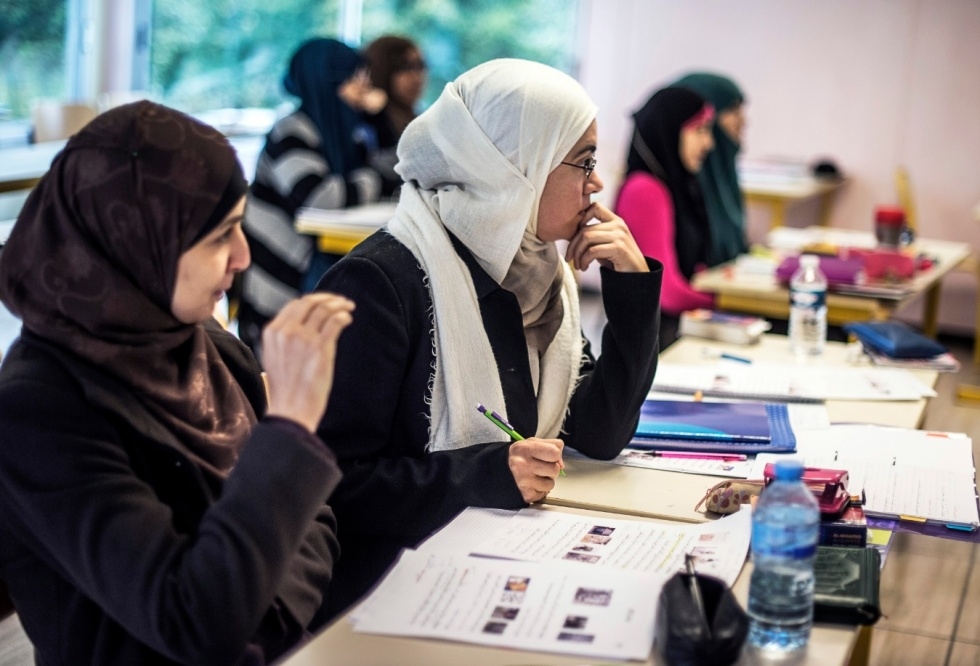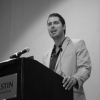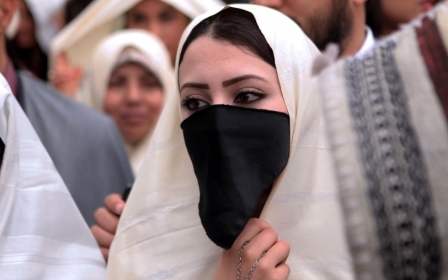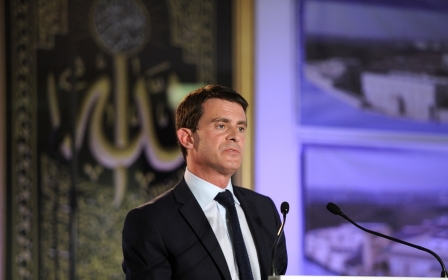What is secular fundamentalism?

Of all the variant strains of fundamentalism, secular fundamentalism might be the least talked about. In fact, many secularists deny the very existence of secular fundamentalism. “What’s that, someone who champions the separation of church and state a little too hard?” they joke.
Not only is secular fundamentalism a thing, but also we may now be seeing its very negative side effects in France today.
In a recent interview, I asked Reza Aslan, a prolific religious writer and scholar of religion, why it is that secular fundamentalists, particularly New Atheists, deny secular fundamentalism is real. “They don’t know what fundamentalism is,” answered Aslan. “Fundamentalism is a singular outlook in a pluralistic world.”
Urban Dictionary defines secular fundamentalism as “the adherence to anti-religious ideology that militantly ridicules, mocks, scorns and satirizes the idea of the existence of a deity or deities and or religion, indifferent of feelings of bigotry, intolerance, hatred and persecution that adherents feel as a result.” It also engages in “propaganda and bullying and insults as tactics to push adherents to abandon their professed beliefs and or convert them into like-minded individuals”.
In practice, secular fundamentalism looks like any of the following examples:
Atheist group files lawsuit against the National September 11 Memorial & Museum for including a Christian cross as one of the thousands of 9/11 artifacts.
Atheist group files lawsuit against Indiana town to have a 50-year-old nativity scene removed from outside a local courthouse.
Atheist group sues to remove a Christian cross at a US military base that had been erected to honour five fallen comrades - all Christians - because the cross was erected on public land.
What do any of the above incidences have to do with France?
Over the course of the past decade, France has not only become, arguably, the most secular fundamentalist state - but it “does so more militantly than any other”. In the United States, the Constitution protects the freedom of individuals to express their deeply held religious beliefs. In France, the law protects the individual’s freedom to not to have to see others express their religion.
“Secularism is the closest thing the French have to a state religion,” notes Henri Astier. “It underpinned the French Revolution and has been a basic tenet of the country's progressive thought since the 18th Century. To this day, anything that smacks of official recognition of a religion - such as allowing Islamic headscarves in schools - is anathema to many French people. Even those who oppose a headscarf ban do so in the name of a more modern, flexible form of secularism.”
In 2010, the National Assembly of France passed a bill banning the covering of the face - a law whose sole intent was to deny Muslim women the right to wear a burqa or veil. In 2013 a nursery school assistant was fired for refusing to remove her Islamic veil. A poll taken shortly thereafter found that 84 percent of French citizens oppose the wearing of the Islamic veil or even the headscarf.
Following the human and infrastructure devastation of World War II, the French sought to attract migrants from its former Muslim-majority colonies in North Africa. “This did not lead to an immediate questioning of secularism,” notes Astier. “The first immigrants had no desire to find in France the mullahs they had left behind.” Astier also observes that it is these older predominately Muslim migrants who “are at the forefront of moves to ban headscarves from schools”.
The grandchildren and great grandchildren of this first generation see the world very differently. Full employment was almost guaranteed to those who migrated to France during the 1960s and ‘70s. Today’s generation of French Muslims, however, are faced with poverty, alienation, ghettoisation, anti-migrant sentiment and a youth unemployment rate of 23.7 percent.
Faced with these economic and social pressures, third and fourth generation French Muslim citizens view Islamic headscarves and outward displays of “Muslimness” to be a “way of expressing anger and forging an identity”. Conservative Islamic traditions have become a vehicle for disenfranchised French Muslim youth to rebel against the state, i.e. the secular fundamentalist state.
Is it any wonder French Muslims have become such easy targets for Islamic State [IS] recruiters?
A new report shows that nearly half of all militants who have travelled from Europe to join IS in Iraq and Syria are from France. More than 1,430 French citizens have made their way to the territory held by IS, representing 47 percent of militants from Europe.
The Charlie Hebdo attackers were not radicalised on foreign battlefields. They were radicalised at home - in France. Moreover, neither one of them came from highly religious backgrounds.
One may dismiss it as mere coincidence that an overwhelming majority of European militants are being recruited from the most hyper-secular state on the continent, but such a dismissal ignores overwhelming causation.
France’s hyper-secular laws are increasingly making French Muslims feel like outsiders. “Let’s face it: they’re visually different … and speak another language, so they’re perceived as outsiders,” observes Carolyn Dudek, a professor of political science at Hofstra University. “They’re kind of ghettoised, because they are a lower socio-economic status, it [makes them] ripe for the picking of ISIS or Salafi Islam. Their community is on the internet and social media. Young Muslims … feel part of the [online] community and they don’t feel part of their community in France.”
IS propaganda appeals to an alienated Muslim community because it posits that it’s at war with the West, thus becoming alluring for disenfranchised Muslim communities who want to reject French culture.
“It is no secret that Islamic fundamentalism is a threat to democracy, freedom and security in today's world, especially in the Middle East,” observes Mustafa Akyol. “Yet the same values can be threatened by secular fundamentalists, too.”
While secular fundamentalism is not rooted in an extreme interpretation of holy texts, it is an extreme interpretation of the works of the Enlightenment thinkers. Secular fundamentalism thrusts forth the idea that religion and the religious are impediments to human progress and modernity, and thus must be extinguished.
“The outcome of this mindset is an authoritarian strategy: political power is to remain in the hands of the secularist elite. Thus the ‘secular republic’ equals the ‘republic of seculars’ - not the republic of all citizens,” writes Akyol. “Thus the role of the secular state is, in the minds of secular fundamentalists, to suppress religious communities, restrict religious education and ban visible signs of observance such as the head scarf.”
It was militaristic secular fundamentalism (along with despotic corruption) that gave birth to the Muslim Brotherhood in Egypt. It was US-backed militaristic secularist fundamentalism that gave birth to the Islamic revolution in Iran. Recent history in the Middle East has demonstrated time and time again that when states proactively seek to silence religious or political dissent, more extremist roots take hold.
“You can take religion out of the state, but not out of the nation,” writes Karen Armstrong in Fields of Blood: the History of Religion and Violence. When the French colonised Muslim-majority countries, “the army officers wanted to secularise but found themselves ruling devout nations for whom a secularised Islam was a contradiction in terms. Undeterred these rulers declared war on the religious establishment.”
Secular fundamentalism and its ideological cousin, anti-theism, were at the root of the anti-religious genocides of the 20th century. The anti-theists of the Soviet regime believed they were championing “rationalism”, “secularism” and scientific advancement in the name of purging religion. In Antireligious Propaganda in The Soviet Union: A Study of Mass Persuasion, David E Powell illustrates how the former communist state’s effort to discourage religion via anti-religious propaganda ultimately failed to persuade. Frustrated, the Soviets turned to violence. “Religion,” a Soviet Minister of Education remarked, “is like a nail. The harder you hit it, the deeper it goes in.”
The French secular state is hitting religion, particularly Islam, hard. In a sense, French evangelical secularists are playing a zero-sum game. “We frequently see secularists urging the state to intervene in the private religious affairs or practices of people or organisations," says Jean Baubérot, a professor emeritus of sociology at Paris University. "Increasingly, secularity resembles what Jean-Jacques Rousseau called a 'civil religion': the values and dogma of a state that individual citizens must submit to - or be made to respect."
Other French social commentators have observed that politicians and the broader public are using “secularity as an alibi to express increasingly Islamophobic attitudes."
Counter-violent extremism experts have noted that while there is no one model that accurately follows the trajectory of each individual violent extremist, it is well documented that alienation, discrimination and political impotency are common triggers. With nearly 1,500 French citizens fighting alongside IS in Syria and Iraq, coupled with the fact that it is estimated more than 200 French citizens have returned to France from the Islamic State, it might serve France well to learn a lesson from the Soviets - i.e. back off the hammer, and work towards a more pluralistic secular ideal.
- CJ Werleman is the author of Crucifying America, God Hates You. Hate Him Back, and Koran Curious and is the host of Foreign Object. Follow him on Twitter @cjwerleman
The views expressed in this article belong to the author and do not necessarily reflect the editorial policy of Middle East Eye.
Photo: Pupils attend an Arabic course on 16 October 2012 in a classroom at the European Institute of Social Sciences in France (AFP)
New MEE newsletter: Jerusalem Dispatch
Sign up to get the latest insights and analysis on Israel-Palestine, alongside Turkey Unpacked and other MEE newsletters
Middle East Eye delivers independent and unrivalled coverage and analysis of the Middle East, North Africa and beyond. To learn more about republishing this content and the associated fees, please fill out this form. More about MEE can be found here.





